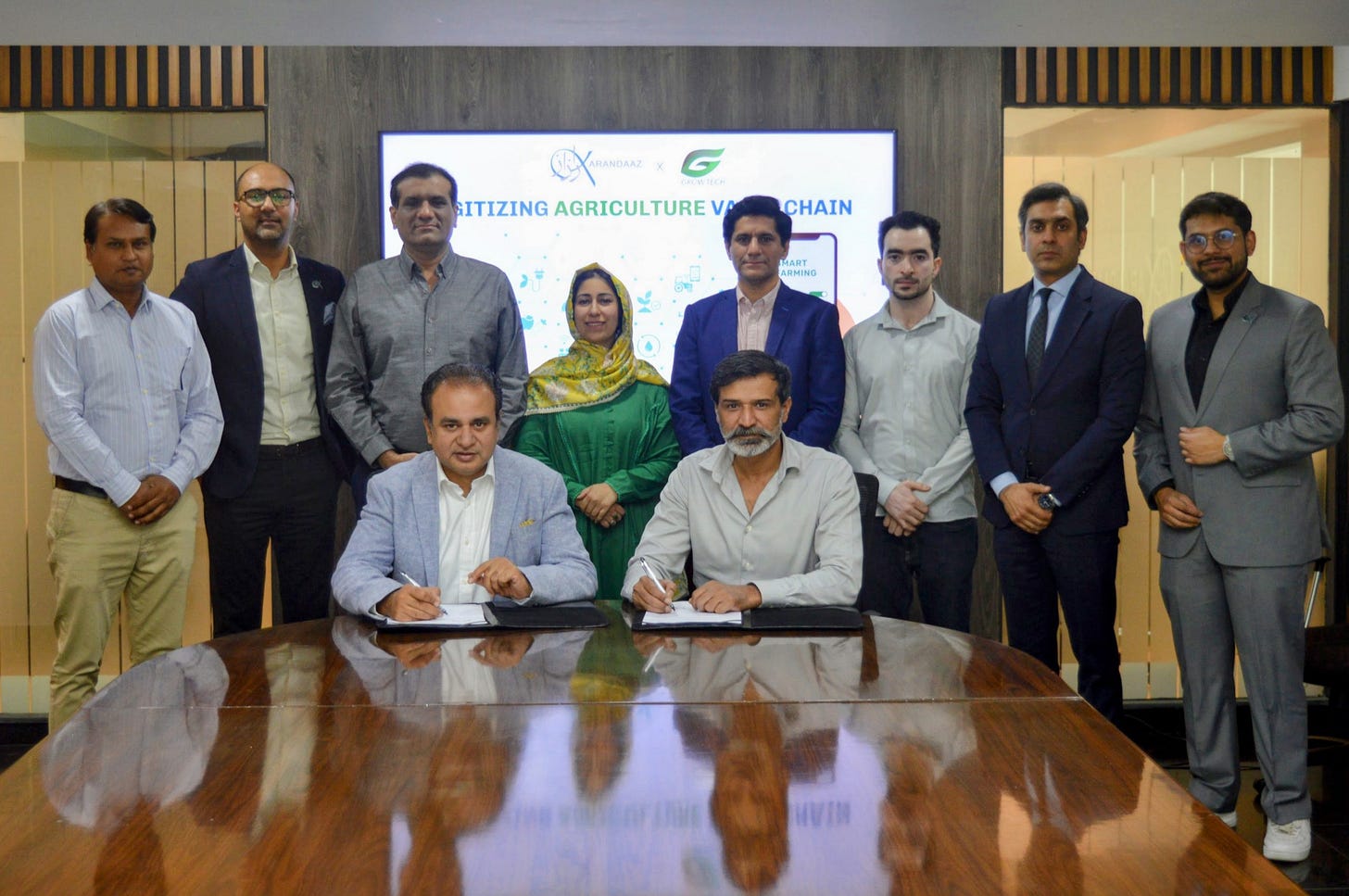Digital agriculture in LMICs - 22 May #87
Growtech and Karandaaz partner in Pakistan; Sojitz to leverage AI for Thai farmers; 60 Decibels unveils digital ag insights from Nigeria
16/05/25
60 Decibels presents insights on digital farmer services in Nigeria
On May 15th, impact measurement company 60 Decibels hosted a webinar to share findings from its Nigeria Digital Farmer Services (DFS) National Pilot Study. The session featured speakers from the Gates Foundation, weather forecasting company Ignitia, and Nigerian agritech startup Hello Tractor. The study, based on interviews with over 1,300 farmers (44% women), aims to shift the conversation from supply-side performance to demand-side insights, focusing on how farmers actually use and benefit from digital tools.
The study found that two in five farmers used a digital tool at least once during the 2023-2024 agricultural season, with information and advisory services being the most commonly used digital farming solution. 60 Decibels however highlights that few farmers find advisory services valuable and timely. According to the study, only 4% of farmers used market linkages services, but farmers who do use these solutions generally report a positive experience.
Repeated use of information digital farming services in the 2023-24 main agricultural season
Source: 60 Decibels
About 17% of farmers use digital means (directly or indirectly) to access inputs but mainly to get recommendations and seller information. Digital services are less common for placing orders or accessing credit for inputs. 60 Decibels also found that the use of digital financial services remains low, with only 5% of farmers accessing credit via digital tools.
This pilot is part of a broader effort to develop practical impact metrics for digital agriculture. An interactive dashboard with similar insights, such as one already published for Kenya, is helping stakeholders better understand what truly benefits smallholder farmers.
20/05/25
Growtech and Karandaaz partner to support Punjabi farmers
Karandaaz, a not-for-profit organisation promoting access to finance for SMEs and financial inclusion, and local agritech GrowTech have announced a partnership to support farmers in the region of Punjab through digital agriculture services. The initiative aims to expand access to smart farming practices, digital financial tools, and market linkages in underserved rural areas. GrowTech will provide farmers with advisory services, market linkages, and access to input suppliers, enhancing productivity and profitability. To support this, farmer facilitation centers will be established offering in-person assistance, digital training, and capacity-building programs.
Photo credit: Digital Pakistan
The partnership also aims to streamline supply chains by collaborating with local logistics providers, ensuring timely distribution and improved market reach for farmers. Additionally, a pilot program will introduce financing options through electronic warehouse receipts, allowing farmers to store produce and alleviate capital constraints.
Source: Growtech
Growtech is a climate smart agritech, providing digital On/Off farm solutions to improve productivity and efficiencies while reducing environmental impact. Besides farmers, the startup works with banks, MFIS, insurance companies, agribusinesses and input supplier and mandis (middlemen). In 2022, Growtech partnered with local mobile operator Zong 4G to provide agritech solutions to Zong subscribers.
20/05/25
Japan's Sojitz leverages AI to support Thai farmers
Sojitz, a Japanese trading company, has launched an agricultural app that uses AI to support smallholder farmers in Thailand. The initiative is focused on the cassava value chain and aims to address the challenges faced by Thai farmers, including declining crop yields and labor shortages. The AI-powered solution provides real-time data analysis and decision-making support to optimise various aspects of farming, such as irrigation, fertilisation, and pest control. The plan is to eventually develop a holistic solution that offers complete support to farmers from guidance on soil conditions to market linkages.
In 2024, Sojitz established an agritech subsidiary in Thailand dubbed Sojitz Kaset Dee, combining the Thai word for good (dee) and farming (kaset). Cassava is Thailand’s third highest crop behind the top two major crops of sugarcane and rice. There are approximately 760,000 cassava farm households many of which are small, family-run farms. Sojitz has also invested in Ricult, a US-based agritech startup operating primarily in Pakistan and Thailand.
09/05/25
Good reads (1): Foresight Africa report highlights digital agriculture’s role to transform food systems
In the Brookings Institution’s Foresight Africa 2025–2030 report, the International Institute of Tropical Agriculture ((IITA) and CGIAR call for urgent digital innovation to transform Africa’s food systems. With the region grappling with climate change, soil degradation, and rapid population growth, the two organizations stress the role of emerging technologies like AI, blockchain, and IoT in supporting smallholder farmers.
The article showcases several successful digital agriculture tools. Among them are IITA’s Cassava Disease Surveillance platform and Cassava Seed Tracker in Nigeria, which support disease monitoring and strengthen market linkages across the cassava value chain. Also featured in the article is CGIAR’s PlantVillage Nuru, an AI-powered, offline-capable tool that diagnoses cassava diseases. The app, publicly developed with no commercial ties, has been deployed in India, Kenya, and Tanzania, ensuring farmers' data privacy.
Other innovations highlighted include RiceAdvice, a free Android app by research center AfricaRice that provides farm-specific guidance on rice management, and NextGen Agroadvisory, a precision agriculture initiative in Ethiopia led by the Alliance of Bioversity International & CIAT, with support from CGIAR and AICCRA (World Bank).
15/04/25
Good reads (2): GSMA blog explores Apollo Agriculture’s AI journey
A recent blog from GSMA looks at how Kenya-based agri-fintech Apollo Agriculture is using AI to close the agricultural financing gap for smallholder farmers. The company has a suite of digital agriculture tools including advisory services, quality inputs, credit and crop insurance. It uses AI to predict loan repayment potential by analysing unconventional data points, such as mobile money usage and historical yield trends. One notable strategy is its "lend-to-learn" model: by intentionally lending to higher-risk farmers, Apollo gathers key data to improve its risk prediction models. Apollo also applies machine learning techniques to detect unusual user behaviours and data anomalies that could signal fraud.
In addition to financial services, Apollo is exploring the potential to use generative AI to develop field agent companions for agronomic support. Future tools may also offer real-time, photo-based pest detection and planting advice, accessible to farmers with basic and feature phones. Established in 2016, the startup has served over 400,000 farmers. To date, Apollo has raised a total of approximately USD 67.8 million across multiple funding rounds.






